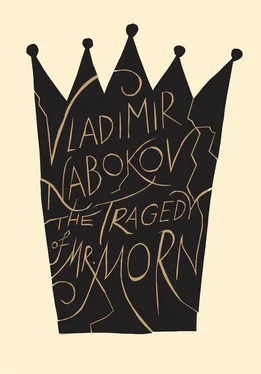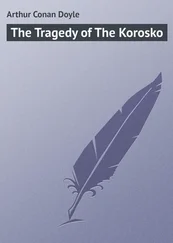SECOND VOICE:
He’s inebriated!…
THIRD VOICE:
His eyes shine with madness!…
MORN:
Edmin, pour me
some more…
LADY [ to the gentleman ]:
Let’s go. I am frightened…
[…]*
[KING]:
A dream once interrupted cannot be resumed,
and the kingdom which sailed before me in a dream
is suddenly revealed as merely standing
on the earth. Reality has suddenly intruded.
That, which is flesh and blood, once seemed to glide
like translucent ether; now, suddenly,
stomping like a rough giant, it has entered
into my solid but fragile dream. I see
around me the ruins of towers which soared up
to the clouds. Yes, a dream is always
an illusion, all is a lie, a lie.
EDMIN:
She lied
to me too, my sovereign.
KING:
Who lied, Edmin?
[ suddenly remembers ]
Oh, you talk of her?… No, my kingdom
was an illusion… The dream was a lie.
[…]*
[MORN]: [3]
Edmin, give it to me!… What else should I do?
Fall to my knees? Would you like that? Ah, Edmin,
I must die! I am guilty, not before Ganus,
but before God, before you, before myself,
before my people! I was a bad king:
unseen, without courtiers, I ruled by deception…
All my power lay in my mysteriousness…
The wisdom of my laws? The creativity
and joy of power? The love of the people?
Yes. But empty and deceiving, like the pale jester
in his moon-like smock, was the soul of the ruler!
I appeared now in a mask upon the throne,
now in the drawing room of a vain lover…
Deception! And my flight was the lie, the trick—
do you hear?—of a coward! And this glory
is but the kiss of a blind man… Am I
really a king? A king who killed a girl?
No, no, enough, I will fall—to death—
to fiery death! I am but a torch,
thrown into a well, flaming, whirling, flying,
flying downwards to meet its reflection,
that grows in the darkness like the dawn…
I beg you! I beg you! Give me my black pistol!
You do not speak?
[ Pause .]
Well then, don’t… There are
other deaths in this world: precipices
and maelstroms, poisons and blades, and the knot.
No! You can no more stop a sinner killing
himself, than a genius from being born!
[ Pause .]
But then, I am demeaning myself in vain
by these requests… A complicated game
with such a simple denouement is boring.
[ Pause .]
Edmin, I am your king. Give it to me.
You understand?
[EDMIN, without looking, extends the pistol to him .]
MORN:
Thank you. I will go out
onto the terrace. Only the stars will see me.
I am happy and lucid; I could not speak
more truthfully… Edmin, I’ll lightly kiss
your light brow… Silence, silence… Your
silence is sweeter than any known songs.
So. Thank you.
[ walks towards the glass door ]
The blue night takes me away!
[ He goes out onto the terrace. His figure, illuminated by the night rays, can be seen through the glass door .]
EDMIN:

…No one must see how
my King presents to the heavens,
the death of Mister Morn.
CURTAIN
Further Reading

The Tragedy of Mister Morn was first published in 1997 in Zvezda , a Russian literary journal, as “Tragediia Gospodina Morna” (“The Tragedy of Mister Morn”), edited by Serena Vitale and Ellendea Proffer and with an introduction by Vadim Stark ( Zvezda , no. 4 [1997], pp. 6–98). This translation is based on the play as it subsequently appeared in book form: Tragediia Gospodina Morna (St. Petersburg: Azbuka Press, 2008), edited by Andrei Babikov and containing the Russian text of Nabokov’s other plays.
Many if not all of Nabokov’s other writings cast light on Morn . Of especial interest, however, are the early Russian writings, included in the volumes of his collected works in Russian: Sobranie sochinenii russkogo perioda v piati tomakh ( Collected Works of the Russian Period in Five Volumes ), with various editors and an introduction to each volume by Alexander Dolinin (St. Petersburg: Symposium, 1999–2000). For readers without Russian, many of Nabokov’s other early plays are translated by Dmitri Nabokov in The Man from the USSR & Other Plays (San Diego: Bruccoli Clark/Harcourt Brace Jovanovich, 1985), which also contains his important essay on drama, “The Tragedy of Tragedy.” Early poems which offer comparisons with Morn are translated in Nabokov, Selected Poems , edited by Thomas Karshan (New York: Knopf, 2012). Early short stories, many of which bear on Morn , are translated in The Stories of Vladimir Nabokov (New York: Knopf, 1995). This last volume contains two short stories, “Ultima Thule” and “Solus Rex,” which Nabokov wrote in 1939–40 and which are the only surviving remnants of a novel that would clearly have re-developed the themes of Morn . Traces of that project are also to be found in Nabokov’s novel Bend Sinister , and still more so in the Pale Fire , the work in which Nabokov most directly re-addressed the images, themes, and ideas of Morn .
The definitive biography of Nabokov is the two-volume work by Brian Boyd, whose first volume deals with the period in which Nabokov was writing Morn and contains a critical analysis of the play: Vladimir Nabokov: The Russian Years (London: Chatto & Windus, 1990). Critical analysis is also offered, for those who read Russian, in Andrei Babikov and Vadim Stark’s introductions to their respective editions of Morn . Apart from these, there has been little critical analysis of Morn to date. Exceptions are: Gennady Barabtarlo, “Nabokov’s Trinity: On the Movement of Nabokov’s Themes,” in Nabokov and His Fiction: New Perspectives , edited by Julian Connolly (Cambridge: Cambridge University Press, 1999), pp. 109–38; Siggy Frank, “Exile in Theatre/Theatre in Exile: Nabokov’s Early Plays, Tragediia Gospodina Morna and Chelovek iz SSSR ,” in the Slavonic and East European Review , vol., no. (October 2007), pp. 629–57; A. Iu. Meshchanskii, “‘Tragediia Gospodina Morna’ kak predtecha russkoiazychnoi prozy V. V. Nabokova,” in Voprosy filologii , no. 11 (2002), pp. 100–108; and R. V. Novikov, “‘Tragediia Gospodina Morna’ V. Nabokova: k poetike ‘p’esy-snovideniia,’” in Maloizvestnye stranitsy i novye kontseptsii istorii russkoi literatury XX v.: Materialy mezhdunarodnoi nauchnoi konferentsii, Moskva , edited by L. F. Alekseeva and V. A. Skripkina (Moscow: Moscow State Open University, 2003), pp. 181–87.
Much has been written about Nabokov more generally. Excellent starting points are The Cambridge Companion to Nabokov , edited by Julian Connolly (Cambridge: Cambridge University Press, 2005) and the encyclopaedic Garland Companion to Vladimir Nabokov , edited by Vladimir Alexandrov (New York: Routledge, 1995). Other recent critical studies include: Vladimir Alexandrov, Nabokov’s Otherworld (Princeton, NJ: Princeton University Press, 1991); Julian Connolly, Nabokov’s Early Fiction: Patterns of Self and Other (Cambridge: Cambridge University Press, 1992); Leland de la Durantaye, Style Is Matter: The Moral Art of Vladimir Nabokov (Ithaca, NY: Cornell University Press, 2007); Alexander Dolinin, Istinnaia zhizn’ pisatelia Sirina (St. Petersburg: Academic Project, 2004); Thomas Karshan, Vladimir Nabokov and the Art of Play (Oxford: Oxford University Press, 2011); Leona Toker, Nabokov: The Mystery of Literary Structures (Ithaca, NY: Cornell University Press, 1989); and Michael Wood, The Magician’s Doubts: Nabokov and the Risks of Fiction (Princeton, NJ: Princeton University Press, 1995).
Читать дальше












